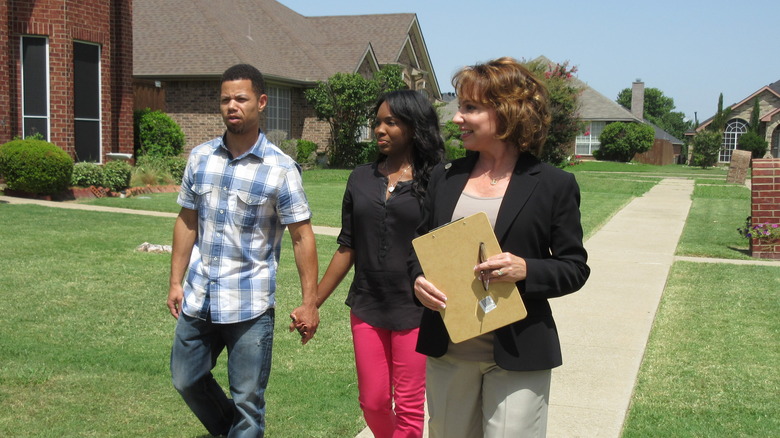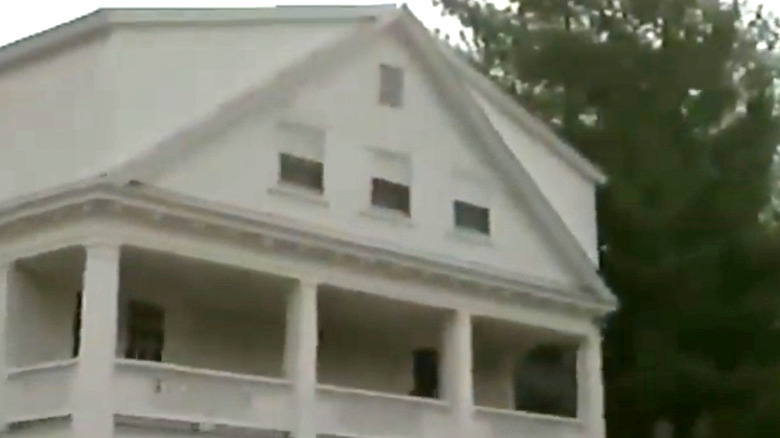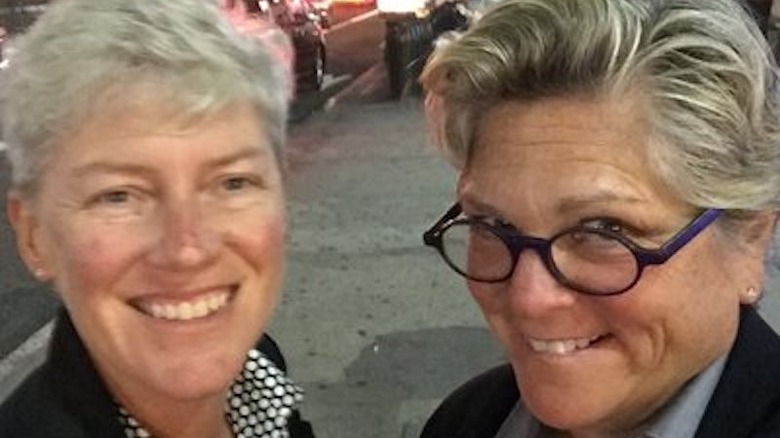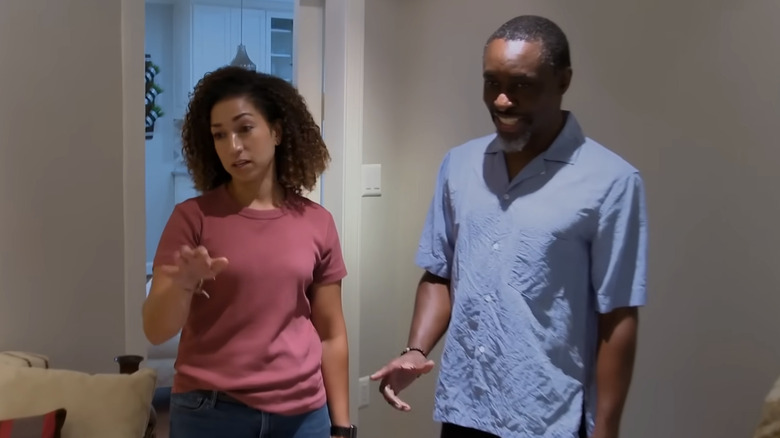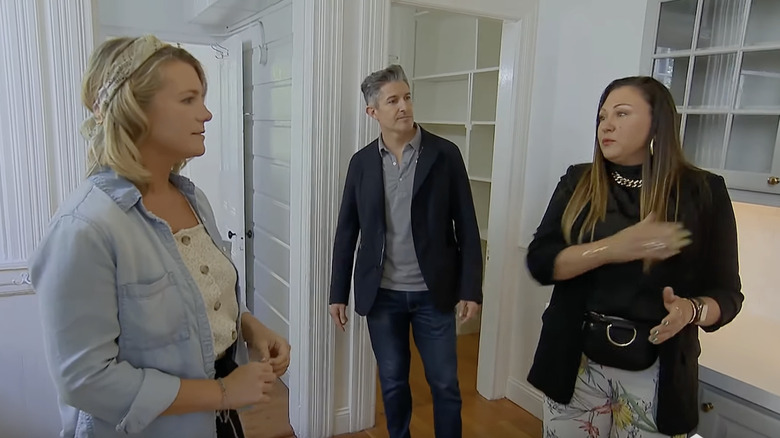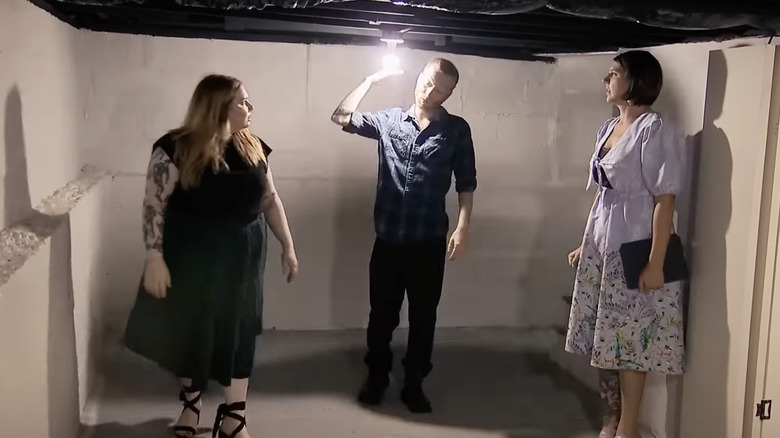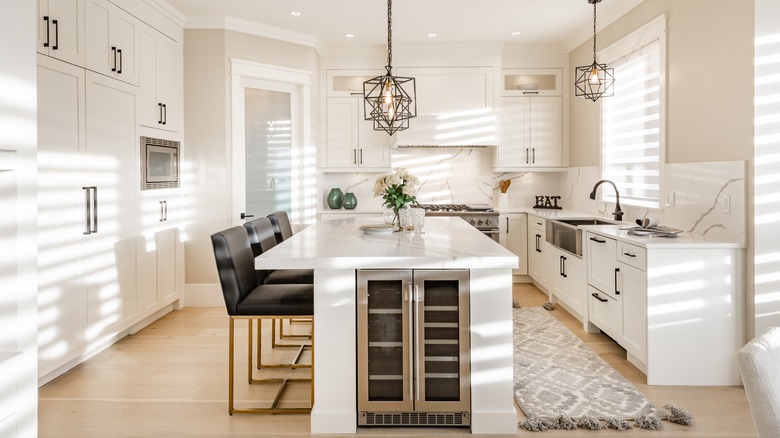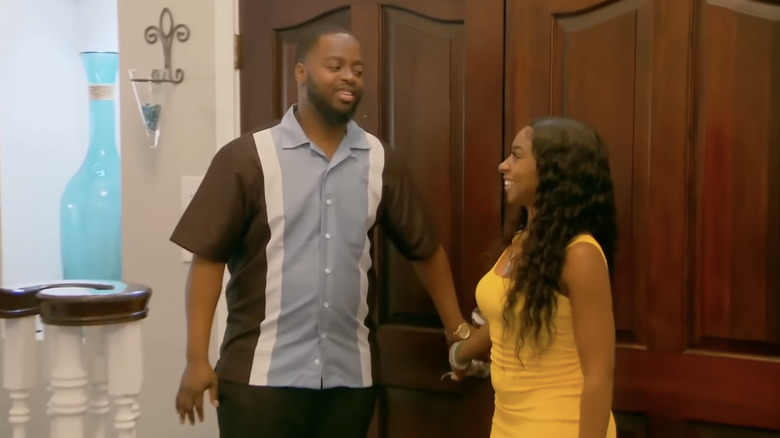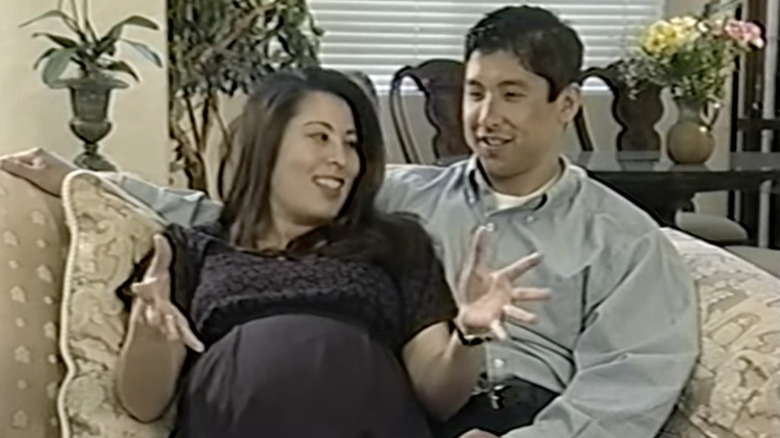What Fans Don't Know About The Creators Of House Hunters
Launched in 1994, the new TV cable channel HGTV — which is an acronym for Home and Garden Television — changed the face of television, ultimately introducing viewers to the concept of house-flipping while popularizing such personalities as "Fixer Upper" couple Chip and Joanna Gaines, and "Property Brothers" siblings Drew and Jonathan Scott.
The cable net's first real hit was "House Hunters," which made its debut in 1999 and proved to be a bona fide game changer. As The Washington Post noted in 2019, "House Hunters" went on to become something of the jewel in the crown for HGTV; initially launching with 26 episodes, the show has continued its success throughout the ensuing decades, spawning in excess of a dozen spinoffs and continuing to land within the top 10 in the cable ratings, decades after it first premiered.
What even the most hard-core fans of the show may not realize is that "House Hunters" is the brainchild of television producers Tara Sandler and Jennifer Davidson. The duo — who are a real-life couple in addition to business partners — produce the show through their company, Pie Town Productions, which is also responsible for such HGTV hits as "Flip or Flop," "Christina on the Coast," and, of course, all those "House Hunters" spinoffs, ranging from "House Hunters International" to "Tiny House Hunters." To find out more about these talented and successful TV producers, read on to discover what fans don't know about the creators of "House Hunters."
Their first show was about country inns
Long before they created "House Hunters," Jennifer Davidson and Tara Sandler pitched an idea to TLC for what would become Pie Town Productions' very first show, "Great Country Inns."
As the pair revealed in an interview with VoyageLA, the show had a minuscule budget. As a result, they wound up being incredibly hands-on throughout the entire process. "We had a skeleton crew and did every job necessary, from producing/directing to FedEx runs to janitorial duties," Sandler said, noting that the experience proved to be something of a television-production boot camp that revealed lessons that would prove instrumental in their future productions. "It forces you to use your experience from every aspect of the business."
In fact, they told Cosmopolitan that each episode was budgeted at $17,000, which included the costs of bringing the show's host and crew to the location of a particular inn. Producing television so cheaply necessitated that Davidson and Sandler performed the kind of low-level tasks that are typically farmed out to others on productions with larger budgets, ranging from administration to location scouting to the actual directing and editing of the episodes. "You know, am I going to do a FedEx run today? Or am I going to clean the toilets? Or am I going to record the [voiceover] scratch track for the editor? Or am I going to go out and direct the episode? Or am I going to write the episode?" Sandler said.
The actual home search of Tara Sandler and Jennifer Davidson inspired them to create House Hunters
As fans of "House Hunters" are surely aware, the show is as formulaic as it gets. Each episode tends to follow a near-identical format — a prospective homebuyer, usually a couple, is looking for that perfect dream home that meets all their needs and also fits into their budget. A real estate agent then shows them three different houses, and they select the one they feel best meets all their criteria. The end.
While that format may seem predictable, it also bears a large degree of responsibility for the enduring success of the show. And, as series creators Tara Sandler and Jennifer Davidson revealed in an interview with Cosmopolitan, it was inspired by their own real-life search for their own home back in the 1990s. As they explained, they were ready to move up from the "starter" house they were living in, but were encountering serious difficulties finding the right place.
Finally, they found an abode that didn't quite check all the boxes, but could fit the bill — albeit with some renovations. "We both looked at each other and said, 'Wow, this is really stressful. This could be a really good idea for a show,'" recalled Sandler. "So we decided, let's go back to the office, and we'll put an offer in on the house, and we'll write up a pitch and send it off. That's how we created 'House Hunters.'"
The creators of House Hunters set the template for HGTV
When Jennifer Davidson and Tara Sandler first brought the concept of what would eventually become "House Hunters" to programming executives at HGTV, they caught a big break. As they told Cosmopolitan, the same exec with whom they'd worked at TLC with "Great Country Inns," Michael Dingley, had taken a job at HGTV. "At that time, HGTV was mainly doing DIY programming. It was more craft-oriented," Davidson explained. "And Michael really wanted to take more narrative storytelling and apply it to HGTV."
In fact, "House Hunters" marked something of a sea change for HGTV programming. Not surprisingly, that led to a pretty steep learning curve, for both the producers and the folks with whom they were working at the network. "For a network that was experimenting with a new genre, there was a lot of back and forth," said Davidson of the initial episodes of "House Hunters." "I think we probably sent them many, many cuts for that very first episode and for that first season."
The format that they created was something that had never been done on television before. As Davidson told VoyageLA, their youth and inexperience at the time — which could have been seen as a liability — actually proved to be the secret sauce that allowed them to blaze a new trail in television. "Sometimes, it's better not to know what the roadblocks are and to keep persevering," Davidson said.
The original House Hunters budgets were bargain-basement low
When series creators Tara Sandler and Jennifer Davidson got the go-ahead for "House Hunters," they were thrilled to land a new type of show on what was, at the time, a new type of network. By no means, however, did they feel as if they'd hit the jackpot, given the tiny budget that had been allocated for the show. "I think it was something like $28,000 an episode," Sandler told Cosmopolitan.
While that was still more than that of their first TV series, "Great Country Inns," it was still small in comparison to what it typically costs to produce a half-hour of unscripted television. Due to the show's budgetary limitations, there was no money for any extended travel, meaning all the house-hunting had to be done within the confines of Los Angeles and the surrounding areas. While shooting in L.A. may not have provided much geographic diversity, the city proved to be fertile in other areas. "But in terms of ages and ethnicities and those types of demographics, we had a very diverse pool of people to choose from," Davidson said.
The lessons they learned early on, in no small part due to the microscopic budgets they were forced to work within, led Pie Town Productions to earn a reputation in the industry for producing quality TV on the cheap. "We're known as the company to deliver shows on time and on budget with really good storytelling," Davidson proudly told VoyageLA.
House Hunters was a TV trailblazer in LGBTQ+ television programming
Filming "House Hunters" in Los Angeles due to budgetary constraints may have limited the locales in which the show could operate, but it led series creators Tara Sandler and Jennifer Davidson to uncover a vast reserve of personalities who sparkled on television. Due to statistically larger gay populations in cities such as L.A., it also provided the two — who have long been out and proud lesbians — an opportunity to feature gay and lesbian couples on the show.
"One thing we were doing back in '98, '99 that was a little unusual is we were featuring some gay couples who were looking for houses," Davidson told Cosmopolitan. "Like everybody else, this was a life ritual that they were fulfilling, and we treated them just as we would treat any other family or straight couple." While that may seem to be no big deal to feature gay people in an HGTV series, back in that era it was both groundbreaking and more than a little bit radical. "That was kind of new to the world of reality TV and even fiction at that time," Davidson said.
According to Sandler, HGTV never balked about gay representation on the show. "The network said, 'Let's not make a big deal out of it.' They've always said that. 'They're a couple like anyone else.' We don't point anything out and it's been that way since 1998," she told Xfinity back in 2014 (via The Advocate).
House Hunters is all about storytelling
When "House Hunters" first premiered, it was markedly different from HGTV's earlier content. At that time, the network's shows typically focused on the DIY aspects of home repair, like demonstrations and renovation techniques. And even though each "House Hunters" episode featured different people, telling a stand-alone story, that storyline remained remarkably consistent from episode to episode: A single or couple looking for the ideal home is presented with three options by a helpful and knowledgeable real estate agent, and then one of those three is chosen as the one.
Nowadays, storytelling may seem to be an obvious element of any good HGTV series, but that's only because "House Hunters" creators Tara Sandler and Jennifer Davidson pretty much laid the groundwork that most subsequent HGTV programming built upon.
The series' solid storytelling also explained its late-in-primetime time slot, airing in the 10 p.m. hour. "Our executive used to refer to it as a good bedtime story," Sandler told Cosmopolitan. "That's why it was on at 10 p.m. He was like, 'It's a nice way to decompress from the day and go to sleep.'" The series also had something of an interactive element to which viewers could easily relate. "You play along by deciding, which would I choose? And so, am I like these people, or am I different from these people?" observed Shawn Shimpach, associate professor of cinema studies at the University of Massachusetts at Amherst, in an interview with The Washington Post.
How their work for HGTV shaped their personal design style
Overseeing all those episodes of "House Hunters" proved to be life-changing for series creators Jennifer Davidson and Tara Sandler on a multitude of levels. One of those was the way in which the show came to influence their own personal design choices when determining the aesthetics of their own home. "Our shows are a constant source of inspiration and have been for a long time," Davidson told Los Angeles Daily News (via the Sarasota Herald-Tribune).
When Sandler and Davidson decided it was time to update the look of their home's kitchen, they turned to one of their Pie Town Productions' shows, "Designers' Challenge," relying on the design expertise of Troy Adams, a Los Angeles designer who appeared on the show.
Adams wound up redesigning much of their home, utilizing a three-pronged fusion approach that melded his love of Asian aesthetics with the functionality of American design and European-influenced style elements that added an additional touch of sophistication. "Those three elements together make up fusion design, which you can see here," Adams said of the couple's redesigned home, which corrected a variety of problems. "It's a sleek sculptural product that's very high-tech, modern, and highly engineered," he added.
Tara Sandler and Jennifer Davidson shared tips on how to get cast in an HGTV series
Having produced "House Hunters" and its myriad spinoffs for well over two decades, series creators Tara Sandler and Jennifer Davidson intimately know what kind of personalities they're looking for when casting for their shows. As Sandler told Los Angeles Times back in 2014, each week their company, Pie Town Productions, receives approximately 50 applications from people seeking to be on one of their various home-renovation series.
According to Sandler, one big bonus for applicants is to have a truly awful-looking space in dire need of renovation. The crappier the better. "You can't have a kitchen that already looks good; it's not going to make sense," Sandler explained. In addition, she noted that those expecting to be cast need to be ready and willing to jump into the renovation themselves, and should have strong opinions about what they like and dislike — and be able to express those opinions forcefully and eloquently. "But really the most important thing is that they are passionate about the project," she added.
That said, competition to be cast in an HGTV home-reno show can be fierce. "We are inundated with people wanting to be on our shows," HGTV exec Allison Page told the Times, revealing it wasn't out of the ordinary for the network to receive up to 100 applications from HGTV wannabes each week.
Tara Sandler and Jennifer Davidson have created many other TV shows besides House Hunters
"House Hunters" creators Tara Sandler and Jennifer Davidson are responsible for many other TV shows — some familiar, others perhaps a bit more obscure. Among their most memorable series are "Flip or Flop" for HGTV, and the TLC hit "A Baby Story," now regarded as a watershed series in the annals of reality television. "That show was to some extent groundbreaking, because reality TV at that point featured mainly cops; there was 'Cops,' 'Rescue 911.' There was very little out there that featured family rituals in reality television," Davidson told Cosmopolitan. "'A Baby Story' kind of made a big splash. That put us on a path of being more recognized in the industry."
As they confirmed in an interview with VoyageLA, Pie Town Productions has produced well over 10,000 hours of television programming; in addition to producing shows for TLC and HGTV, the company has also delivered shows for the likes of WeTV, Lifetime, Food Network, and others.
As Davidson told Cosmopolitan, they soon began earning a reputation for delivering compelling programming on a low budget and within some tight timeframes, placing them in high demand within the industry. "That's why we had these executives coming to us and saying, 'What if we did this?' and trusting that we could figure out what that format would look like and then actually produce 65 episodes on a crazy budget within a given year."
